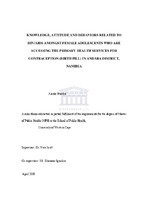Knowledge, attitude and behaviors related to HIV/AIDS amongst female adolescents who are accessing the primary health services for contraception (birth pill) in Andara District, Namibia
Abstract
Background: In Namibia, studies showed that HIV/AIDS affects youth, especially the under 24 years age group. At the same time the pregnancy rate is also high by age 19. Interestingly, in Andara district several reports from staff working in the reproductive services have indicated that adolescent girls, who would seem to be taking responsibility in one sphere of their sexual lives by protecting themselves against unwanted pregnancy, were however not using condoms to protect themselves from HIV infection. Study Aim and Objectives: To describe the knowledge, attitude and behaviour related to HIV/AIDS amongst female adolescents who are accessing the primary health care (PHC) services for contraception. Specific objectives were to describe the knowledge of female adolescents who are accessing the PHC services for contraception about the modes of transmission and prevention of HIV/AIDS, to assess their attitude with regards to condom use, abstinence and being faithful to one uninfected partner, also to determine the significance of association between age and knowledge, attitudes and behaviour, between their education level and knowledge, attitudes and behaviour and the significance of association between knowledge of HIV prevention strategies and behaviour of female adolescents accessing PHC services for contraception in the district. Setting: The study was conducted in Andara district, North East of Namibia. Methods: Descriptive cross-sectional KAB study. Sample: All female adolescents who are accessing PHC services for contraception selected from multistage simple random sampling in 5 facilities and systematic sampling at facility level in Andara. All married women within this age range were excluded in the study. Data collection tool: An interviewer-administered standardised questionnaire was used to collect the data. Data analysis and Interpretations: Epi Info software 2002 was used for data analysis. The results were presented using descriptive statistics including means, 95% confidence intervals and percentages and this information was shown in tables, bar and pie charts. Cross-tabulations of knowledge, attitude and behaviour scores against demographic variables were performed. P-values <0.05 were considered statistically significant. Results: 76.5% knew that unprotected sexual intercourse was the main way of getting HIV/AIDS, 77.3% knew that people could protect themselves by abstaining from sexual intercourse and 64.5% knew that people could protect themselves by having one uninfected faithful sexual partner. Out of 192 respondents who stated that unprotected sexual intercourse was the main way of HIV/AIDS transmission, 25.5% used condom every time they had sexual intercourse, 10.9% used condom almost every time they had sex, 41.1% used condom sometimes and 22.4% never used condom. Older girls and those who were in higher grades at school had more knowledge that could protect them from HIV infection. Later sexual debut is associated with increased condom usage at sexual debut. Conclusions: The general HIV knowledge of respondents and their knowledge of how to protect themselves from HIV infection were disappointing given that this study was conducted in health facilities. In this study we also see that knowledge does not always translate into the appropriate behaviour. The health services need to evaluate the targeting and effectiveness of their HIV educational messages and develop skills that will support behaviour change.

